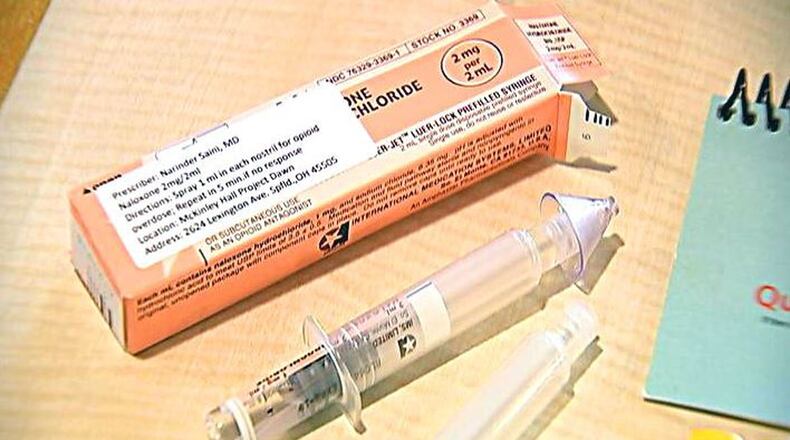Overdose numbers are significantly down this year compared to last year, though officials say it’s inconclusive if the novel coronavirus is the reason for the decline. And outside of one early April anomaly that saw an increase in emergency department visits for overdoses, MHARS Board Executive Director Scott Rasmus said overdose spikes in nearby or neighboring counties haven’t translated to spikes in Butler County.
CORONAVIRUS: Big Butler County festivals rescheduling due to coronavirus
Rasmus said that in early April, an alert was issued about a methamphetamine and fentanyl mixture that hit Butler County.
“We’ve been tracking on overdose deaths, and we’ve been tracking on suicides through the coroner’s office. So far, things are down compared to last year versus baseline except for this anomaly,” he said.
There have been 17 suspected overdose deaths through the beginning of March, six fewer than last year at that time, according to the Butler County health district. There were 35 overdose deaths in all of March in Hamilton County, according to our news partner WCPO.
The health district and MHARS issued an alert to raise community awareness of the potential, especially since first responders and hospital personnel are the front line workers in the COVID-19 pandemic. According to the joint alert, “Physical distancing requirements and other added stressors due to COVID-19 response efforts greatly increase overdose risks for many individuals in our community.”
They are pushing the availability of naloxone — commonly known as the brand name Narcan, which reverses the effects of opioid-based overdoses — as “nearly all drugs contain fentanyl, the drug that can cause overdose and death,” according to the alert.
The health district and MHARS board suggest first responders, as well as service providers, adjust responses. In addition to using necessary protective equipment, they say they should be prepared to use multiple doses of Narcan, according to the two agencies.
Many of the community education efforts have been scaled back due to the COVID-19 pandemic, including in Fairfield. Fairfield Deputy Fire Chief Tom Wagner said the fire department has stopped things like public education events and CPR classes. They’ve also temporarily suspended Quick Response Team trips.
CORONAVIRUS: Ohio to ramp up testing in May thanks to new swab, reagent suppliers
Wagner said Fairfield did see a spike in March, responding to 15 overdoses, which was an apparent outlier and it’s uncertain if it’s pandemic-related. There were only four in January, nine in February and seven to far in April.
Wagner said the department is fully capable of balancing responding to emergencies amid the pandemic, but their biggest concern is keeping fire personnel safe.
“If someone’s unconscious and can’t talk to you and tell you, ‘I got a cough and I’m running a fever,’” he said. “It’s those kinds of cases where you’re trying to insert an airway into someone’s mouth, or you’re down close to somebody’s face that puts us the most at risk, so we’re really at heightened alert to protect our people during that.”
Fairfield Fire Department changed its protocols where they may use certain devices and not others. Medics are now using face shields, safety glasses and gowns, in addition to gloves and N-95 masks.
“That is a worry that potentially that population is more at risk of contracting COVID-19 than maybe an average citizen without a drug problem,” Wagner said. “We’re on guard more when we respond to places where maybe we see frequent overdoses at, and we’re making sure our personnel is safe. We’re treating every patient as if they’re infected … because you don’t know.”
RESOURCES
If you or someone you know overdoses, you should call 911 if Narcan has been administered. Here are some resources for those in need of help with drug addiction:
Regional Exchange Project: For those in need of Narcan, safe injection supplies or fentanyl testing strips, please call 513-833-7859. For Narcan only, call the Butler County General Health District at 513-863-1770.
Heroin HopeLine: Anyone seeking information on treatment providers offering services, call 844-427-4747, or visit thehopelineoc.org.
Harm Reduction Ohio: A nonprofit organization authorized to distribute naloxone, commercially known as Narcan, in Ohio. For details, visit www.harmreductionohio.org/get-naloxone.
Never Use Alone: An organization that is "a life-saving point of contact for people who use drugs." For more information, call 800-484-3731 or visit neverusealone.com.
About the Author

